Sunday, 24 May 2009
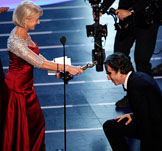 Pierre Trudeau’s essay “Some Obstacles to Democracy in Quebec” was first published in the old Canadian Journal of Economics and Political Science in August 1958 — when Premier Maurice Duplessis was still shouting “orders to the Speaker” of the Quebec legislative assembly. “French Canadians,” Trudeau wrote at the time, “must begin to learn democracy from scratch. For such is the legacy of a history during which [among other things] ... as Catholics ... they believed that authority might well be left to descend from God.” There is no one quite like Maurice Duplessis in Canadian federal politics today, just over a half-century later. (Those not currently in jail who share the opinions of Conrad Black might even want to add “unfortunately.”) But there is concern in the Ottawa air that in 2009 we are “Witnessing a democracy's decline.” A learned book has just been published on Canadian federal politics with the somewhat ominous title Parliamentary Democracy in Crisis. And a meeting at Metro Hall in Toronto this past still-so-called Victoria Day holiday could make you wonder whether all this is, in some important enough degree, the legacy of a history in which especially English-speaking Canadians, as constitutional monarchists, have believed that authority actually does descend from the Divine Right of Kings (and nowadays Queens too, of course). Pierre Trudeau’s essay “Some Obstacles to Democracy in Quebec” was first published in the old Canadian Journal of Economics and Political Science in August 1958 — when Premier Maurice Duplessis was still shouting “orders to the Speaker” of the Quebec legislative assembly. “French Canadians,” Trudeau wrote at the time, “must begin to learn democracy from scratch. For such is the legacy of a history during which [among other things] ... as Catholics ... they believed that authority might well be left to descend from God.” There is no one quite like Maurice Duplessis in Canadian federal politics today, just over a half-century later. (Those not currently in jail who share the opinions of Conrad Black might even want to add “unfortunately.”) But there is concern in the Ottawa air that in 2009 we are “Witnessing a democracy's decline.” A learned book has just been published on Canadian federal politics with the somewhat ominous title Parliamentary Democracy in Crisis. And a meeting at Metro Hall in Toronto this past still-so-called Victoria Day holiday could make you wonder whether all this is, in some important enough degree, the legacy of a history in which especially English-speaking Canadians, as constitutional monarchists, have believed that authority actually does descend from the Divine Right of Kings (and nowadays Queens too, of course).
* * * *
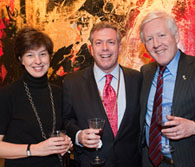 I attended the event at Metro Hall myself, 1–4 PM ET, Monday, November 18, 2009. The master of ceremonies was Phil Taylor of radio station CIUT's “The Taylor Report.” And the lead speaker was Peter Donolo, Director of Communications for Prime Minister Jean Chrétien from 1993 to 1999, and currently an executive vice president and partner at the polling and consulting firm The Strategic Counsel. I attended the event at Metro Hall myself, 1–4 PM ET, Monday, November 18, 2009. The master of ceremonies was Phil Taylor of radio station CIUT's “The Taylor Report.” And the lead speaker was Peter Donolo, Director of Communications for Prime Minister Jean Chrétien from 1993 to 1999, and currently an executive vice president and partner at the polling and consulting firm The Strategic Counsel.
It suggests at least something about both the Canadian present and future that a political insider quite as eminent as Peter Donolo is speaking at something called “Canada after the Queen: Options and opportunities” — a “forum about the growth of public opinion for ending the monarchy and what Canada should be doing to prepare for a republic.”
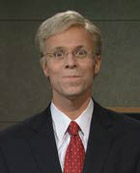 There were also remarks from Tom Freda, national director of the sponsoring organization, Citizens for a Canadian Republic, and from Charles Roach, the Toronto civil rights lawyer who is leading a pioneering Charter of Rights court challenge of the current compulsory oath to the offshore Queen across the sea for new Canadian citizens. There were also remarks from Tom Freda, national director of the sponsoring organization, Citizens for a Canadian Republic, and from Charles Roach, the Toronto civil rights lawyer who is leading a pioneering Charter of Rights court challenge of the current compulsory oath to the offshore Queen across the sea for new Canadian citizens.
The comic and satirist Alan Park, a regular cast member on CBC's Air Farce LIVE, heaped much amusing good-natured abuse on an increasingly obsolete institution. (“Her majesty the Queen of England is nothing more than a corporation. It’s like swearing allegiance to Kentucky Fried Chicken.”) My friend and colleague Randall White offered some slightly less comedic and vaguely more respectable remarks as well, on the constitutional ins and outs of abolishing the British monarchy in Canada at last. And he has kindly allowed me to reproduce these remarks here, for whoever may or may not be interested:
“Canada after the Queen: Options and opportunities”
We live in an age of “renewal and re-invention,” Barack Obama told us last week. And this sums up my feelings about our topic today — “Canada after the Queen: Options and opportunities.”
Cutting our very last apron string to the offshore monarch far away in Buckingham Palace, at the end of the present reign of Elizabeth II, or even earlier, will open up a new age of renewal and re-invention in Canada. And that’s exactly what we need, I think, if our unique Canadian institutions are going to survive the 21st century.
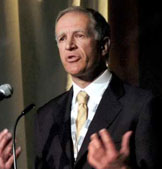 I also agree with Bob Hepburn at the Toronto Star, in his column just this past week, “It's time Canada said goodbye to the Queen.” As he has pointed out: “Over the past 15 years, polls have repeatedly shown the majority of Canadians favour abolishing our ties to the monarchy.” I also agree with Bob Hepburn at the Toronto Star, in his column just this past week, “It's time Canada said goodbye to the Queen.” As he has pointed out: “Over the past 15 years, polls have repeatedly shown the majority of Canadians favour abolishing our ties to the monarchy.”
Yet as Bob Hepburn has explained as well: “it will take ... time before Canada says goodbye to the Queen.” This is partly because, he goes on, “few of us care deeply about the issue and few politicians dare to rock the boat.” It is also, I think, because, as the opponents of saying goodbye like to stress, when you start to think about it the exercise is bound to be somewhat complicated.
To me the main conclusion from all this is that, however long it may take to reach the ultimate objective, it’s time right now to start sorting out the complications — so that we will be prepared, e.g., if the present reign of the 83-year-old Elizabeth II should unhappily come to a sudden end.
What I am going to do here, just to stimulate debate, is quickly suggest four such complications — and how they might be managed in a new Canadian age of renewal and re-invention.
The Canadian people ... don’t ask, don’t tell
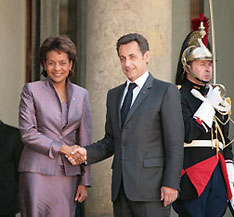 The first complication concerns a matter of principle. As things stand, the practical sovereign power in Canada today is the Canadian people who, among other things, vote in elections and referendums. Yet what is now known as the Constitution Act 1867 still prescribes that the formal or theoretical sovereign power in Canada is the British monarch. The first complication concerns a matter of principle. As things stand, the practical sovereign power in Canada today is the Canadian people who, among other things, vote in elections and referendums. Yet what is now known as the Constitution Act 1867 still prescribes that the formal or theoretical sovereign power in Canada is the British monarch.
What saying goodbye to the Queen means in this context is saying hello to the Canadian people, in both theory and practice. And what some opponents of saying goodbye to the Queen argue here is that Canada has still not evolved to the point where there is such a thing as a Canadian people, capable of taking over sovereign power from the British monarch, theoretically as well as practically. Our policy now about the Canadian people, if you like, is don’t ask, don’t tell.
I don`t myself agree with this point of view at all. But I do think we who want to say goodbye to the Queen have to frankly recognize that the modern Canadian people constitute a quite complicated and diverse historical phenomenon. We stretch from the fur-trading first nations in the 16th century to the latest new Canadian citizens from around the world in the 21st century. We have two official languages, and a dazzling rainbow of cultural origins in the global village.
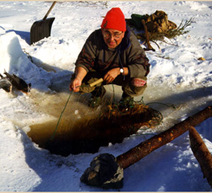 I ran into an intriguing document in this connection, while doing research for the Charter of Rights challenge to the compulsory Canadian citizenship oath to the Queen, currently being advanced by Charles Roach, Michael McAteer, Ashok Charles, and others, in the Ontario courts. I ran into an intriguing document in this connection, while doing research for the Charter of Rights challenge to the compulsory Canadian citizenship oath to the Queen, currently being advanced by Charles Roach, Michael McAteer, Ashok Charles, and others, in the Ontario courts.
This document is a 1996 article by the Osgoode Hall Law School professor Brian Slattery, called “The Organic Constitution: Aboriginal Peoples and the Evolution of Canada.” Its key argument is that “Aboriginal peoples should be viewed as active participants in generating the basic norms that govern us — not as people on the fringes.” They are where the Canadian people begin. And, Brian Slattery urges, understanding this at last in our time “represents a further stage in the long process of decolonization that Canada has undergone since 1867.”
Saying goodbye to the Queen will represent the very last stage in this long process of decolonization. Meanwhile, what do we have to do about the aboriginal beginnings of the Canadian people, to get ready for saying goodbye properly? Happily, I think, what is needed has already been at least begun, in sections 25 and 35 of the Constitution Act 1982, which recognize the historic rights of the “aboriginal peoples of Canada.” But there are a few other particular dimensions to the present-day Canadian people that still do need some ultimate constitutional clarification. And I will come back to this at the end of my remarks.
The parliamentary democratic alternative ... India and Ireland as models
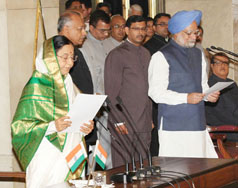 The second complication I want to talk about focuses on the question “what are we going to replace the British monarchy in Canada with?” Or, who is going to personify the newly sovereign Canadian people, in form as well as practice, in the institutions of government? The second complication I want to talk about focuses on the question “what are we going to replace the British monarchy in Canada with?” Or, who is going to personify the newly sovereign Canadian people, in form as well as practice, in the institutions of government?
Some among those who do not want to say goodbye to the Queen claim that the only serious answer to this question is the presidential-congressional system of government that prevails in the United States. And, they add triumphantly, this is outside Canada’s historic traditions. For Canada to adopt this alternative would be tantamount to joining the United States.
In fact, however, most members of the present Commonwealth of Nations are republics. And the majority of republics in the world today are not modelled on the United States, but on republicanized versions of the traditional British-style parliamentary institutions that Canada continues to share with such places as Ireland and India.
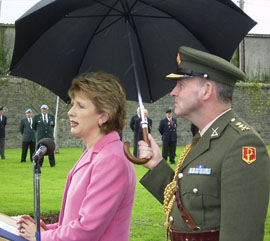 The trick here is in principle simple enough, and has been done before by other former British dominions like Canada. You just convert the present appointed office of governor general, as de facto head of state responsible to the offshore Queen, into some form of elected head of state in law as well as practice, responsible to the Canadian people. The trick here is in principle simple enough, and has been done before by other former British dominions like Canada. You just convert the present appointed office of governor general, as de facto head of state responsible to the offshore Queen, into some form of elected head of state in law as well as practice, responsible to the Canadian people.
Bob Hepburn’s Toronto Star column of this past week does an excellent job of summarizing all this, I think. And I can’t do any better than quote him directly: “Most Commonwealth countries dropped their ties to the monarchy long ago without creating constitutional or political chaos. Most have a prime minister, who leads the elected government, and a president, who is the largely ceremonial head of state ... There are several ways to elect a head of state. For example, in India the president is elected by members of parliament and state legislatures. In Ireland, the president is directly elected by all voters ... Canada could safely choose either route. And if too many Canadians are upset over the title ‘president’ because of its American connotations, then we could find a less controversial title.”
In principle, we could start working on reforming or democratizing our present office of governor general, to get it ready for this kind of ultimate republican transformation, right away — without broaching any controversial constitutional amendments. For this we would need a very high-minded and public-spirited prime minister in office. And whether such a person actually exists at the moment I won’t try to predict. But in the history of this country so far, I think it’s fair to say, stranger things have happened!
The McWhinney shuffle ... something worth thinking about at least
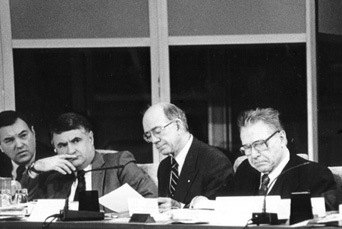 The last two complications of saying goodbye to the offshore Queen both relate to certain technicalities of amending the current provisions about the British monarchy in the Canadian constitution. And the first thing to underline here is that we almost have two written constitutions in Canada today (as well as a rather mysterious unwritten one). We have an old written constitution now known as the Constitution Act 1867, and a still fairly new one called the Constitution Act 1982 (which also contains the Canadian Charter of Rights and Freedoms). The last two complications of saying goodbye to the offshore Queen both relate to certain technicalities of amending the current provisions about the British monarchy in the Canadian constitution. And the first thing to underline here is that we almost have two written constitutions in Canada today (as well as a rather mysterious unwritten one). We have an old written constitution now known as the Constitution Act 1867, and a still fairly new one called the Constitution Act 1982 (which also contains the Canadian Charter of Rights and Freedoms).
Certain sections of the Constitution Act 1867 in its current state still prescribe the Queen’s formal sovereignty over Canada today (sections 9, 17, and 128 are among the most obvious examples). On the other hand, political scientists like the now retired Frederick Vaughan of the University of Guelph have urged that the “republicanism of Prime Minister Pierre Trudeau’s Canadian Charter of Rights and Freedoms [in the Constitution Act 1982] has ‘severed Canadians from their ancestral monarchical foundations.’”
Yet, to wave goodbye altogether to the monarchy in Canada we will have to amend the monarchist sections of the old Constitution Act 1867. And despite its underlying republicanism, the amending formula prescribed in the Constitution Act 1982, for changes to “the office of the Queen,” requires the approval of the “Senate and House of Commons and ... the legislative assembly of each province.”
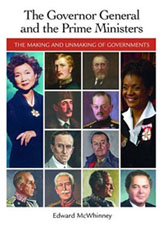 Those who never want to say goodbye to the Queen often urge that the need for unanimous provincial approval of changes involving the constitutional monarchy in Canada makes any such changes practically impossible. But the third complication in the process is actually intended to get around this problem — in some first instance at least. Those who never want to say goodbye to the Queen often urge that the need for unanimous provincial approval of changes involving the constitutional monarchy in Canada makes any such changes practically impossible. But the third complication in the process is actually intended to get around this problem — in some first instance at least.
To quote from a not entirely friendly source, “Upon ... the death or abdication of a sovereign ... it is customary for the accession of the new monarch to be publicly proclaimed by the Governor General, on behalf of the Queen's Privy Council for Canada, which meets at Rideau Hall after the accession.” And Edward McWhinney, a now retired constitutional lawyer, professor of law, and Member of the Canadian House of Commons, has argued that “failure to make this proclamation would result in an empty throne for Canada, leaving the Governor General as full head of state.”
Put another way, if e.g., the present reign of the 83-year-old Elizabeth II should unhappily come to a sudden end, without any prior Canadian constitutional amendments regarding the office of the Queen and so forth, a federal prime minister and government so inclined could say goodbye to the British monarchy in Canada without a constitutional amendment, by advising the Governor General of the day not to proclaim any successor to the Queen in Canada.
A cross-country referendum on amending the Constitution ... eventually
 There have of course been criticisms of Edward McWhinney’s proposal from Canadian monarchists. And even for ardent republicans it can only be a useful transitional measure. To end the British monarchy in Canada definitively and altogether according to Hoyle, there will no doubt eventually have to be amendments under the Constitution Act 1982 to those parts of the Constitution Act 1867 that still prescribe the Queen’s formal sovereignty over Canada. There have of course been criticisms of Edward McWhinney’s proposal from Canadian monarchists. And even for ardent republicans it can only be a useful transitional measure. To end the British monarchy in Canada definitively and altogether according to Hoyle, there will no doubt eventually have to be amendments under the Constitution Act 1982 to those parts of the Constitution Act 1867 that still prescribe the Queen’s formal sovereignty over Canada.
Here I come to the final fourth complication in the process of change we are discussing today. I agree that our unhappy experience trying to amend the present Canadian constitution in the early 1990s — under the terms of the so-called Charlottetown Accord, if anyone still remembers that — has made Canadian politicians and related public officials quite reluctant to open up any further cans of constitutional worms for any immediately foreseeable future.
At the same time, however, as I noted earlier, there remain at least two particular dimensions to the present-day Canadian people that still do need some ultimate constitutional clarification in their own right. They are the place of the Quebecois within the larger Canadian people, and the role of similar geographically based diversities in other parts of the country, reflected in the longstanding debate on Canadian Senate reform.
Perhaps because I am not taking the proper medication, I still have faith that at some point we in Canada will at last agree on what to do about these thorny constitutional issues, and move to get it done. When this happens, it will also present an opportunity for constitutional amendments that definitively say goodbye to the British monarchy in Canada.
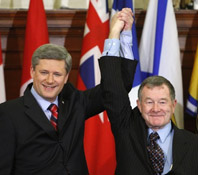 When this opportunity finally arises it seems to me as well that if you look back at the last time we dealt with such matters — in the Charlottetown Accord of 1992 — it was not any inability of all 10 provinces to agree on the details of reform that ultimately made constitutional change impossible. All 10 provinces did agree to the Charlottetown Accord. What finally stopped the thing was its failure to gain majority approval from the practically sovereign people of Canada in a national referendum. This referendum was not necessary under the Constitution Act 1982. But our political leaders of the day felt that the quite large changes envisioned in the Charlottetown Accord had to be endorsed by the Canadian people if they were going to work. When this opportunity finally arises it seems to me as well that if you look back at the last time we dealt with such matters — in the Charlottetown Accord of 1992 — it was not any inability of all 10 provinces to agree on the details of reform that ultimately made constitutional change impossible. All 10 provinces did agree to the Charlottetown Accord. What finally stopped the thing was its failure to gain majority approval from the practically sovereign people of Canada in a national referendum. This referendum was not necessary under the Constitution Act 1982. But our political leaders of the day felt that the quite large changes envisioned in the Charlottetown Accord had to be endorsed by the Canadian people if they were going to work.
This unwritten precedent, I think, almost certainly means that there will finally have to be a national referendum to end the formal role of the British monarchy in Canada today. And my feeling is that if Canadian republicans can win this referendum, in all 10 provinces, then the approval of all 10 provincial legislatures will look after itself.
This also gives me as much of a conclusion as I have to my complicated and I hope not too vastly confusing remarks here. Whatever else may or may not eventually prove true, the main challenge for all of us who do want to see the end of the British monarchy in Canada is to help build more and more popular support for this objective.
As Bob Hepburn has noted, we already have a majority on our side. The most obvious task ahead is to promote a larger and larger majority among the practically sovereign Canadian people. When this majority is large enough, the now quite obsolete old colonial monarchy in Canada will finally come to an altogether definitive end — like an over-ripe apple falling from a tree.
Earlier report, April 5: SOME OBSTACLES TO DEMOCRACY IN CANADA .. who cares about the will of the majority these days?
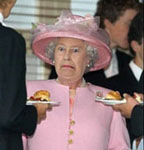
You have to think twice about anything datelined April 1 — even when it comes from "the non-profit Prometheus Institute based in Victoria, Canada." I am still not sure just what to make of "G-20 2009 Harper Shamed Into Respecting the Rule of Parliament," by Joan Russow, Ph.D. The very first sentences are suspicious: "At a press conference, prior to the G-20 Summit, the issue of democracy and governance was raised. René Descartes [sic!], a reporter from Le Monde, asked Prime Minister Harper about the functioning of minority and coalition governments in Canada." And only an April fool could believe the conclusion: "Harper, thoroughly embarrassed, pledged that when he would return he would respect the vote in Parliament." Still, Ms. Russow’s fable is raising some poignant questions about the will of the majority in Canadian democracy today. And these questions are given some real-world traction in the Globe and Mail‘s April 2 report that: "The Queen and possibly Prince Charles will come to Canada within the next year and a half, the Prime Minister's Office confirmed ... " As wonderful as the Queen was with the Obamas on the eve of the G20 Summit, I can’t help but recall that some 55% of respondents in a 2008 Angus Reid poll supported Canada’s ending its formal ties to the British monarchy. Apparently, a minority government that, as Ms. Russow also notes, has received only "38% of the national vote" is not going to be too concerned about what a majority of the Canadian people think. But what about we the Canadian people ourselves?
Elitism and democracy in Canada today ... 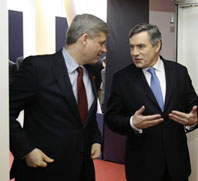 It is customary to say that the British monarchy counts for very little in Canada today (or even call it the Canadian maple-leaf monarchy, if you really must — the monarch involved is still the British monarch, who lives at Buckingham Palace in the UK). And in many respects this is no doubt quite true. It is customary to say that the British monarchy counts for very little in Canada today (or even call it the Canadian maple-leaf monarchy, if you really must — the monarch involved is still the British monarch, who lives at Buckingham Palace in the UK). And in many respects this is no doubt quite true.
The monarchy survives, even though it is no longer supported by a majority of Canadians, because it has virtually no practical impact on what the Constitution Act 1982 calls the "free and democratic society" in present-day Canada. (Or at least insofar as it does, the practical role is now played by the now appointed-in-Canada Governor General, as illustrated by various Ottawa hi-jinks this past fall, also nicely alluded to by Joan Russow in "Harper Shamed Into Respecting the Rule of Parliament.")
Yet there is a more subtle symbolic sense in which the monarchy in Canada today continues to prop up and even vaguely legitimize some ancient strands of an old colonialist, anti-democratic elitism in Canadian political culture. And over the past number of years it has increasingly seemed that this has more practical (and unfortunate) consequences for Canadian government and politics than it is usually given credit for.
One practical enough thing the so-called "constitutional monarchy" still means in Canada, e.g., is that our assorted official or ruling strata are not so concerned to at least pretend to be following the will of the democratic majority in the development of public policy. In practice it is supposed to be the sovereign people who decide who is going to form governments in our democratic elections. But in theory sovereignty is still said to rest with the sovereign across the seas. (Or as section 9 of the Constitution Act 1867 puts it: "The Executive Government and Authority of and over Canada is hereby declared to continue and be vested in the Queen.") And this, whatever else, still reduces the prestige of appeals to the sovereign Canadian people in public debate.
Ms. Russow’s fable: Questions from René Descartes and Cecco Angiolieri
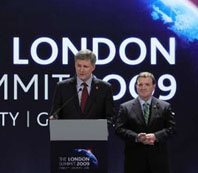 It is current Prime Minister Stephen Harper’s robust and even aggressively anti-democratic willingness to short-change the will of the majority in the popularly-elected Parliament of Canada today that Joan Russow, Ph.D. cutely enough satirizes in her April Fool’s Day 2009 concoction "Harper Shamed Into Respecting the Rule of Parliament." It is current Prime Minister Stephen Harper’s robust and even aggressively anti-democratic willingness to short-change the will of the majority in the popularly-elected Parliament of Canada today that Joan Russow, Ph.D. cutely enough satirizes in her April Fool’s Day 2009 concoction "Harper Shamed Into Respecting the Rule of Parliament."
To start with, in response to René Descartes’s alleged question about "minority and coalition governments in Canada," Prime Minister Harper apparently "explained that there was not a tradition of coalition governments in Canada, and that he had received 38% of the national vote, and he was not required to form a coalition."
This led to a further question from M. Descartes: "If you are not required to form a coalition so that you have a majority in Parliament, how does the voting work?" And to this "Harper explained that while there were three Opposition Parties that represented over 62% of the voters of Canada, and while the three Opposition Parties often voted together, he was not required to act on the majority of Parliament."
This prompted one Cecco Angiolieri, from La Strada in Rome, to ask "if Canada¹s position on international issues was decided by a majority vote." And here "Harper explained that, in Canada, in order to sign and ratify an international, covenant, convention, treaty, all that was required was consent by the Prime Minister and his/ her cabinet, which he selected from the elected members in his Party."
Ronald Quixote’s ultimate point: Canada today does not have a democracy
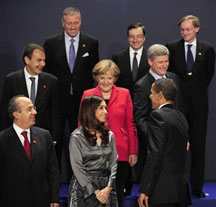 At this juncture "Ronald Quixote, from the La Duende, from Madrid, asked about the role of the Governor General. Harper pointed out that the Governor General, who is selected by the Prime Minister, but is sanctioned by the Queen of England, has generally supported him in his requests." At this juncture "Ronald Quixote, from the La Duende, from Madrid, asked about the role of the Governor General. Harper pointed out that the Governor General, who is selected by the Prime Minister, but is sanctioned by the Queen of England, has generally supported him in his requests."
Then Prime Minister Harper explained how: "In the Fall of October, 2008, the three Opposition Parties got together, and decided that they would form a coalition government-in-waiting and would support a non-confidence vote in Parliament to bring down the government. Harper said that he was concerned that his government would fall, and he went to the Governor General again and asked her to prorogue Parliament — suspend Parliament. Rather than call upon the coalition to form a government, the Governor General granted his wish again."
As Ms. Russow explains: "At this moment there was a hush at the press conference, Then one reporter after another from countries such as China, Russia, and Saudi Arabia, explained that Canada did not have a democracy, and that they were appalled that a vote of the majority in Parliament did not count, and raised the issue of Harper¹s ability to speak for Canada."
And finally we have the almost concluding part of Ms. Russow’s piece, which makes absolutely clear it is just an April Fool’s joke after all: "Harper, thoroughly embarrassed, pledged that when he would return he would respect the vote in Parliament."
Doing something sensible about the British monarchy in 21st century Canada as one key to the bigger problem ...
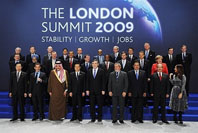 Back in the unambiguously real world, it would be altogether unfair to blame the present Harper minority government in Ottawa for all the obstacles to democracy in Canada today. Back in the unambiguously real world, it would be altogether unfair to blame the present Harper minority government in Ottawa for all the obstacles to democracy in Canada today.
Since the end of the Second World War in 1945, e.g., there have been 21 Canadian federal elections (including the election of June 11, 1945). And the political party that formed the government of the day — sometimes with a minority but mostly a majority of seats in Parliament — has only won at least 50% of the cross-Canada popular vote four times, in 1949, 1953, 1958, and 1984 .
The simplest explanation here is that over this same period there have always been more than two political parties competing for federal votes. And this typically makes it difficult for any one party to win at least 50% of the vote — although until recently it was usually not so difficult for the party with the largest popular vote to win a majority of seats in Parliament.
At the same time, most recently we have had three elections in a row in which the party winning the greatest share (or plurality) of the cross-Canada popular vote has not managed to win even a technical or working majority of seats in Parliament. Moreover, the average percentage of the popular vote won by the party forming the government over the 10 elections from 1949 to 1974 was 42.2%. The similar percentage over the 10 elections from 1979 to 2008 was only 40.9%.
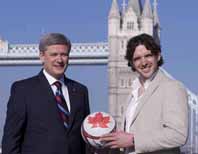 There have been other worrisome failures of democracy in Canadian federal government and politics in the more recent past. Just this weekend the Toronto Star national affairs columnist James Travers has discussed the broader picture in a provocative article called "The quiet unravelling of Canadian democracy ... Muzzled MPs. A powerless cabinet. Politicized senior bureaucrats. Unaccountable parties. Canada's democracy is in trouble. To fix it we have to connect the dots." There have been other worrisome failures of democracy in Canadian federal government and politics in the more recent past. Just this weekend the Toronto Star national affairs columnist James Travers has discussed the broader picture in a provocative article called "The quiet unravelling of Canadian democracy ... Muzzled MPs. A powerless cabinet. Politicized senior bureaucrats. Unaccountable parties. Canada's democracy is in trouble. To fix it we have to connect the dots."
There are various useful approaches to connecting the dots here as well. One thing that is too often overlooked, it seems to me, is the symbolic role of the continuing British monarchy in deadening or at least blunting the very awareness of Mr. Travers’s quiet unravelling of Canadian democracy among the emerging sovereign Canadian people.
As anyone interested can see from looking down below, until very recently I had speculated that, when push came to shove, Stephen Harper’s western populist base of support at least made him somewhat sensitive to such forward-looking concepts. But having now read that: "The Queen and possibly Prince Charles will come to Canada within the next year and a half, the Prime Minister's Office confirmed," I am concluding that this is just another illustration of Mr. Harper’s attraction to the old and increasingly obsolete elitist and anti-democratic strains in the old colonialist version of Canadian political culture.
Personally, I admire Elizabeth II as an individual. I found her encounter with President and Mrs (or Ms?) Obama at this past week’s G20 Summit across the seas in London almost moving. But I think the surviving but increasingly archaic legal fiction that Her Majesty somehow remains the rightful sovereign of Canada has now outlived whatever historic usefulness it may have once had, and should be politely retired in the fullness of time — or even sooner. It has become one of a number of increasingly potent obstacles to the kind of strengthened democracy Canada is going to need, if it really does want to survive the 21st century.
Earlier report, February 25: FROM BRITAIN`S SHORE .. last gasps of the Canada that still won’t grow up?

Change can be threatening. And in the midst of everything else nowadays, there seems a sudden urge in some parts of the Canadian mass media to take a wild last stab at keeping the British monarchy alive in the most northern regions of North America. These days as well you have to wonder. Does this have anything to do with the news that "Queen Elizabeth II relaunched the British monarchy's website on Thursday [February 12] with the help of World Wide Web inventor Tim Berners-Lee"? Does the royal family across the seas, e.g., subsidize the Canadian monarchist retainer Michael Valpy of the Globe and Mail? Probably not, of course. But Mr. Valpy did raise the question "Has official Canada cooled to Charles?" in the Saturday, February 21 edition of Canada’s self-proclaimed national newspaper. And then on the following Monday, the same paper published an editorial, which concluded: "If Canada is to remain a monarchy, and there are reasonable people on both sides of that particular debate, then it should welcome the Queen and the Prince of Wales." But what does that mean? Meanwhile, the vaguely related question of whether the Battle of the Plains of Abraham should be re-enacted this summer, to help celebrate its 250th anniversary, has prompted some media commentary of a sort that I at least thought had become obsolete sometime last century ...
1. "Has official Canada cooled to Charles?" and recent opinion polls ...
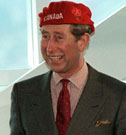 The burden of Michael Valpy’s February 21 piece in the Globe and Mail is that "Charles Philip Arthur George," son of Queen Elizabeth II, is "constitutionally Canada's next head of state." And Mr. Valpy’s sources in the old imperial metropolis say the Prince is "keen to deepen his relationship with the country. He wants to visit, get to know people." The burden of Michael Valpy’s February 21 piece in the Globe and Mail is that "Charles Philip Arthur George," son of Queen Elizabeth II, is "constitutionally Canada's next head of state." And Mr. Valpy’s sources in the old imperial metropolis say the Prince is "keen to deepen his relationship with the country. He wants to visit, get to know people."
Yet, although the "Prince's relationship with the government of Jean Chrétien was warm," the "governments of Paul Martin and Stephen Harper " have "appeared to show little interest in him. Requests to Ottawa from various organizations ... to invite the Prince to Canada have been either ignored or met with tepid interest."
Among other things here, it seems clear enough, Mr. Valpy is missing the results of two recent opinion polls by Angus Reid Strategies. One was taken in November 2007 and the other in February 2008. Both asked the question: "Under the terms of the Canadian Constitution, Queen Elizabeth II holds the position of Canada’s head of state. Would you support or oppose Canada ending its formal ties to the British monarchy?"
Canada-wide some 55% of respondents supported Canada’s ending its formal ties to the British monarchy in February 2008, up from 53% in September 2007. Only 34% actually opposed this option in 2008, down from 35% in 2007. The Angus Reid report on its 2008 poll also noted that: "The prospect of having Prince Charles as King causes slightly more Canadians (58%) to side with ending ties with the monarchy." [Italics added.]
2. Official Canada and the practically sovereign Canadian people ...
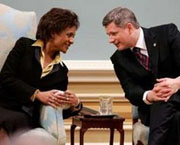 Given all this recent polling data, might it not be that in showing some reluctance to have Prince Charles visit Canada nowadays "official Canada" is just reflecting the views of the majority of the practically sovereign people of Canada it is supposed to represent? (And if this is actually true, good for official Canada!) Given all this recent polling data, might it not be that in showing some reluctance to have Prince Charles visit Canada nowadays "official Canada" is just reflecting the views of the majority of the practically sovereign people of Canada it is supposed to represent? (And if this is actually true, good for official Canada!)
From a somewhat less elevated angle, just focussing on the practical political situation in Ottawa today, would inviting Prince Charles to visit Canada actually help Mr. Harper`s current minority government win a majority of seats in Parliament in the next federal election?
Again given the Angus Reid polling data, which suggests that at least a bare majority of Canadians would now like to see Canada end its formal ties with the British monarchy — and that this majority even increases somewhat when the prospective monarch is King Charles III, and not Queen Elizabeth II — the obvious answer would seem to be (again): Probably not!
(And doesn’t this just show, yet again, that the ultimate sovereign power in Canada today really is the Canadian people — not the British monarch in Windsor Castle across the seas? And isn`t that the way things ought to be nowadays, in any case, in what the Constitution Act 1982 calls our "free and democratic society"?)
3. If Canada isn’t going to remain a monarchy, who cares about Prince Charles?
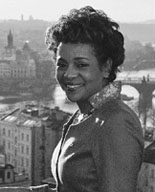 As noted earlier, at least some editors of the Globe and Mail followed up Mr. Valpy`s February 21 piece with an editorial supporting his broad argument about future visits to Canada by Prince Charles: "If Canada is to remain a monarchy, and there are reasonable people on both sides of that particular debate, then it should welcome the Queen and the Prince of Wales." As noted earlier, at least some editors of the Globe and Mail followed up Mr. Valpy`s February 21 piece with an editorial supporting his broad argument about future visits to Canada by Prince Charles: "If Canada is to remain a monarchy, and there are reasonable people on both sides of that particular debate, then it should welcome the Queen and the Prince of Wales."
This argument too would seem to be cast in some doubt by the recent Angus Reid polling data. If it is true that some 55% of Canadians supported Canada’s ending its formal ties to the British monarchy in February 2008, up from 53% in September 2007 — and perhaps especially that only 34% actually opposed this option in 2008, down from 35% in 2007 — then there are some good reasons to doubt that Canada is in fact going to remain a monarchy.
And if Canada is not going to remain a monarchy, on the Globe and Mail editorial`s logic, it is not really necessary to worry unduly about inviting Prince Charles to visit, in the midst of all our economic and other more pressing problems at this particular juncture in our history.
(Canada`s dwindling minority of ardent monarchists, of course, still like to urge that there will be immense practical difficulties in replacing the British monarchy. Yet such other former self-governing British dominions as Ireland and India have shown that this is simply not true. All you have to do is turn the current Governor General into the official or de jure as well as what is now sometimes called the de facto head of state — and provide a more democratic method of selection for the office and perhaps change its name to President in the process. A republican Canada would otherwise remain an independent parliamentary democracy in the Commonwealth of Nations — and La francophonie, just as it is today.)
4. Mr. Harper may not be a republican ... but is he really a monarchist ... and does it matter in any case?
 The Globe and Mail editorial in support of Mr. Valpy`s argument does raise something about Prime Minister Harper and his minority regime in Ottawa that may repay slightly more attention. Whatever else, the editorial urges: "Mr. Harper is not a republican. In his foreword to a book, Crown of Maples, published in 2008 by the federal government, Mr. Harper writes, ‘The Canadian Crown is central to our uniquely Canadian identity.’ He goes on to advocate ‘an even greater awareness and appreciation of this Canadian institution ... ‘" The Globe and Mail editorial in support of Mr. Valpy`s argument does raise something about Prime Minister Harper and his minority regime in Ottawa that may repay slightly more attention. Whatever else, the editorial urges: "Mr. Harper is not a republican. In his foreword to a book, Crown of Maples, published in 2008 by the federal government, Mr. Harper writes, ‘The Canadian Crown is central to our uniquely Canadian identity.’ He goes on to advocate ‘an even greater awareness and appreciation of this Canadian institution ... ‘"
Here a few further points also seem worth noting. First and foremost, Mr. Harper has shown over the past few years that he is not too fussy about rigorously following his proclaimed principles, when his job as Prime Minister of Canada may be at stake. (This is arguably enough in a venerable Canadian tradition — and see more above, on whether inviting Prince Charles to visit would actually help Mr. Harper and his party win a majority government, etc, etc.)
A second point is that the publication of Crown of Maples under Mr. Harper’s minority government in Ottawa has its own narrow political logic. Mr. Harper’s Conservative Party of Canada is the only federal party nowadays that includes a "belief in our constitutional monarchy" as one of the guiding principles enunciated in its constitution (section 2.1.8).
This no doubt flows from the compromises involved in the union of the old Reform-Canadian Alliance and Progressive Conservative parties. And, you might say, there were and still are some republican sympathizers in the old Reform-Canadian Alliance wing of the present Conservative Party of Canada. (Preston Manning, e.g.) But the old Progressive Conservative wing is more resolutely monarchist. So ... publish Crown of Maples to please one faction in your own party. Drag your feet on inviting Prince Charles for a visit to Canada to please another, etc, etc ...
5. Keith Spicer on the "angels-on-a-pinhead fiction" of the Crown of Maples ...
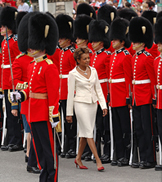 In fact, a version of the booklet Crown of Maples is now available on the world wide web. It does not seem to include Mr. Harper’s preface, to which the Globe and Mail editorial alludes. (For that presumably, one needs to consult the printed hard copy?) But just surfing through the available text on the net certainly makes me wonder just how many Canadians nowadays can take this kind of quaintly archaic political rhetoric seriously? (Or could if they actually knew about it, even if they think they are still supporters of the British monarchy in Canada?) In fact, a version of the booklet Crown of Maples is now available on the world wide web. It does not seem to include Mr. Harper’s preface, to which the Globe and Mail editorial alludes. (For that presumably, one needs to consult the printed hard copy?) But just surfing through the available text on the net certainly makes me wonder just how many Canadians nowadays can take this kind of quaintly archaic political rhetoric seriously? (Or could if they actually knew about it, even if they think they are still supporters of the British monarchy in Canada?)
However many maples you add to it metaphysically, so to speak, the plain fact remains that in the eyes of the rest of the world the crown in Canada — and in the 15 other countries that still recognize Queen Elizabeth II as formal head of state — is worn by the British monarch. And, as the former federal public servant Keith Spicer explained in the Ottawa Citizen this past December, Canada’s alleged crown of maples is "a constitutional joke abroad."
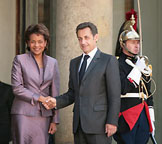 Mr. Spicer, who lives in Paris at the moment, went on: "Try explaining to any foreigner the doctrine of the divisibility of the Crown. This is the angels-on-a-pinhead fiction that a monarch resident in one country is also, ‘separately and equally,’ head of state of 15 other countries — from Canada, Australia and New Zealand to Papua New Guinea, Tuvalu and Belize." Mr. Spicer, who lives in Paris at the moment, went on: "Try explaining to any foreigner the doctrine of the divisibility of the Crown. This is the angels-on-a-pinhead fiction that a monarch resident in one country is also, ‘separately and equally,’ head of state of 15 other countries — from Canada, Australia and New Zealand to Papua New Guinea, Tuvalu and Belize."
The practical problems with all this, Mr. Spicer finally urges, are that "it feeds Quebec separatism almost as much as Jacques Parizeau's tax-sharing rants. It tells Canadian children every day, with each Queen-bearing dollar they clutch, that their country is not quite grown-up. Worst of all, it tells the world that we don't much respect ourselves. That we are an extraordinarily timid people — most unlikely to invent anything, to export sophisticated goods (even a great winter car like Sweden's?), or to make a gutsy stand for a principle ... Our absentee-monarchy-loving image: polite, decent, but slightly slow and parochial ... "
6. Meanwhile ... back at the Battle of the Plains of Abraham ...
 It doesn’t take much imagination or insight into Canadian history to guess that perhaps the strongest bulwark of the British monarchy in Canada has been the more or less privileged position in Canadian society it gives, in symbolic effect at least, to Canadians of British descent. So long as there has been something approaching a British cultural or ethnic majority in Canada, there has been majority support for the monarchy. Now that there is no longer such a thing, there is no longer a majority for retaining Canada’s "formal ties to the British monarchy?" It doesn’t take much imagination or insight into Canadian history to guess that perhaps the strongest bulwark of the British monarchy in Canada has been the more or less privileged position in Canadian society it gives, in symbolic effect at least, to Canadians of British descent. So long as there has been something approaching a British cultural or ethnic majority in Canada, there has been majority support for the monarchy. Now that there is no longer such a thing, there is no longer a majority for retaining Canada’s "formal ties to the British monarchy?"
This is not to say that there are no Canadians of non-British (or mixed) descent who support the monarchy today. The Monarchist League regularly trots out such individuals for ceremonial purposes. (They include former members of various and alleged royal families and aristocracies around the world. And of course let’s not forget that the present royal family in the United Kingdom is arguably more German than British, whatever British as opposed to English, Scottish, Welsh, or [Northern] Irish might mean. And then of course Prince Phillip is Greek. And if Prince Charles had any real brains and forward imagination he would have long ago married the beautiful daughter of some Indian Maharaja or African prince, etc, etc, etc.)
Nonetheless, the British monarchy in Canada has never been seriously popular in French-speaking Quebec. It is, unsurprisingly, still less popular in Quebec than in any other province. And the monarchy is most popular today in those parts of Canada that have so far been less influenced by the increasingly culturally diverse global migrations of the past few generations.
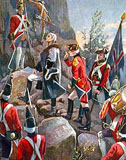 No doubt, the most philosophically weighty arguments against the British monarchy in contemporary Canada turn around its hereditary, aristocratic (or elitist) and profoundly undemocratic character, in what even the present Canadian Constitution now (albeit rather subtly) describes as a "free and democratic society." Another set of narrower theoretical arguments involves the colonialist absurdities of having a head of state who lives in another country — and is shared with 15 other countries. Yet, as students of the quietly growing Canadian republican movement will tell you, much of (if by no means all) its practical political energy also flows from various forms of visceral annoyance (and even "anti-racism") among non-British Canadians. No doubt, the most philosophically weighty arguments against the British monarchy in contemporary Canada turn around its hereditary, aristocratic (or elitist) and profoundly undemocratic character, in what even the present Canadian Constitution now (albeit rather subtly) describes as a "free and democratic society." Another set of narrower theoretical arguments involves the colonialist absurdities of having a head of state who lives in another country — and is shared with 15 other countries. Yet, as students of the quietly growing Canadian republican movement will tell you, much of (if by no means all) its practical political energy also flows from various forms of visceral annoyance (and even "anti-racism") among non-British Canadians.
Something at least vaguely related is going on in the current media controversy over now happily cancelled plans to re-enact the Battle of the Plains of Abraham of 1759 — in which the first British empire at last "conquered" Canada from the old French empire of the ancien regime, a generation before the French Revolution of 1789.
It is beyond me how anyone who has lived through Canadian history since the end of the Second World War (as I have myself, I must confess) can fail to appreciate why re-enacting the Battle of the Plains of Abraham is still bound to offend the majority of French-speaking residents of Quebec — and indeed of French Canadians in all parts of the country today. But for those who still don’t get it I would point to Lysianne Gagnon’s column in the February 23 Globe and Mail, "Emotional echo of the Plains." (And for more on the same subject in the same paper see: "The Battle of the Plains of Abraham isn't over yet" and "Montcalm and Wolfe fail to meet again ... But the feuding clans within the Québécois nation join battle on the Plains of Abraham.")
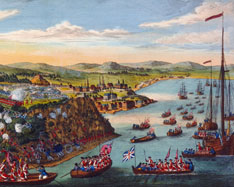 Meanwhile, I have been reminded that my own experience of recent Canadian history is not shared by all other Canadians by a number of what strike me as appalling articles and editorials in the National Post. I cite in particular "A loss Quebecers should celebrate" and "Editorial: Tell Quebec where to get off" — and even "Rudyard Griffiths: A nation's amnesia" (which at best struck me as trying to make two quite different arguments at once?). Meanwhile, I have been reminded that my own experience of recent Canadian history is not shared by all other Canadians by a number of what strike me as appalling articles and editorials in the National Post. I cite in particular "A loss Quebecers should celebrate" and "Editorial: Tell Quebec where to get off" — and even "Rudyard Griffiths: A nation's amnesia" (which at best struck me as trying to make two quite different arguments at once?).
In the end it does seem to me at least that, like the dwindling monarchist minority in Canada today, those who have reacted so fiercely against the cancellation of the re-enactment of the Battle of the Plains of Abraham (which was mostly going to be done by Americans in any case!) are just mourning the increasingly obvious very last days of an old British Canada that has outlived its usefulness. It has never been the original modern Canada, as it were: that was "French and Indian" not British. And its best parts — and I would agree myself that it certainly has had some quite good parts that will continue to live on, in one way or another — have now begun to evolve into something more impressive, and more suited to the 21st century.
As some will remember, this old British Canada had its own unofficial anthem from the 19th century, known as "The Maple Leaf Forever." And, to me at least, again, you only have to quote the original lyrics to this song, to understand why re-enacting the Battle of the Plains of Abraham (or for that matter the British monarchy) does not make much sense in Canada today:
In Days of yore / From Britain's shore / Wolfe the dauntless hero came / And planted firm Britannia's flag / On Canada's fair domain./ Here may it wave, / Our boast, our pride / And joined in love together, / The thistle, shamrock, rose entwined, / The Maple Leaf Forever.
CHORUS: The Maple Leaf / Our Emblem Dear, / The Maple Leaf Forever. / God save our Queen and heaven bless, / The Maple Leaf Forever.
[You can hear the somewhat quaintly stirring music to this old anthem as well in several YouTube clips, e.g.: "The Original 'Maple Leaf Forever'" and "The Maple Leaf forever (original version)."]
As some will also remember, when Canadians of my generation went to elementary school there was an alternate set of lyrics to "The Maple Leaf Forever" for the schoolyard — at least on the boys’ side. I don’t of course know who first thought these words up, and, more importantly, whether their deliberate purpose was to de-legitimize the anthem and its original lyrics for the Canadian future. But that was certainly the impact of this alternate version on me:
In days of yore / Before the war / When safes were not invented / Men tied socks / Around their _________ / And babies were prevented.
(And if we didn’t still officially have the British monarchy in Canada today, I would probably have had the nerve to fill in the blank!) Only registered users can write comments.
Please login or register. Powered by AkoComment 1.0 beta 2!
|
